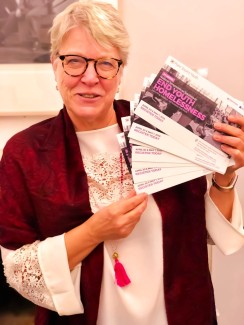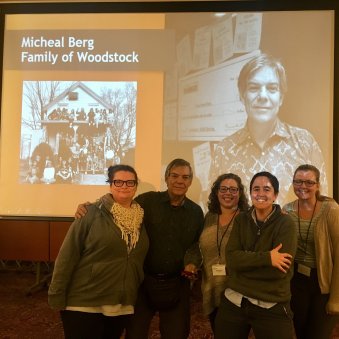Most of us who work in the field of homelessness are familiar with the point-in-time (PIT) count, which entails using volunteers to attempt a census of people experiencing homelessness within a community. These homeless counts are a federal funding requirement from the Department of Housing and Urban Development (HUD), but they also provide valuable information and insight about the prevalence, incidence, and scope of homelessness in a community.
Beyond these explicit and pragmatic purposes, however, homeless counts are also a community engagement event. A broad spectrum of community members concerned about homelessness comes together to engage with the lived reality of homelessness in their community. While some volunteers, like service providers or advocates, may already be familiar with these realities, for many other volunteers, participating in the count is one of the few experiences they will have conversing and engaging with individuals experiencing homelessness. Indeed, some research suggests that participating in a homeless count, and the resulting direct contact volunteers have with individuals on the street, can dispel and mitigate some of the common misconceptions and stigma toward people experiencing homelessness or housing instability. And so, as educators and researchers concerned about the growing distrust and lack of empathy toward people experiencing homelessness, we feel there is great potential to leverage the homeless count as an opportunity for the broader community, including students, to learn about and engage with homelessness.
Balancing Our Roles as Researchers and Educators
During the last couple of years, we have become increasingly involved in the homeless count in our community of Sacramento, California. In 2017, we worked with our community partners to improve the methodology of how the count is conducted— for example, helping design a more rigorous sampling and survey method to increase the reliability of the count. And in 2018, we continued this work to introduce various innovations to improve the accuracy of the 2019 count, from using mobile apps to conduct surveys to improving sampling strategies.
One of the innovations we are most proud of this year has been incorporating our Sacramento State students in the implementation of the homeless count. This past January, over 200 of the 900 volunteers deployed were students. To give a little context, in 2017, only 230 volunteers participated in the Sacramento homeless count, which had been typical for Sacramento since PIT counts began in the region. As such, this year was by far the largest homeless count that Sacramento has ever had—reflecting the sad reality of growing homelessness in our community (and California more broadly), as well as greater engagement from the community, stakeholders, and our university. From our lens that the PIT count is also a community engagement event, the larger turn-out of volunteers and increased community engagement this year represents in some respects a point of success and progress.
Recruiting More Volunteers and Our Students
One of the key points we advocated for this year was the need to seek a broad spectrum of volunteers to participate in the count and to do strategic outreach targeting volunteers who have social service backgrounds (e.g., direct-service providers, social workers, nurses, etc.). We emphasized the importance of having specific volunteers designated as team leads who could leverage their social services experience and expertise to ensure the count was conducted with respect, cultural humility, and professionalism. We encouraged the organizers to recruit and establish teams of volunteers with a variety of experiences and perspectives, with team leads who would use their expertise to help guide the team during the night of the count. We also argued that the team lead should be the key point person to initiate conversations with individuals on the street and to conduct the formal in-person surveys, which are used to estimate the demographic composition of the homeless population in Sacramento. We believed having experienced team leads, and providing them additional training on engagement and interviewing techniques, would increase the response rate of the survey and ensure that conversations were initiated appropriately. We also encouraged organizers to recruit volunteers from our social work program, as well as the broader university.
Incorporating the PIT Count into a Research Course
In our department, students can engage in research through a capstone course. To encourage student involvement in the count, we created a year-long capstone course centered on homelessness and the homeless count. In the spring of 2018, we announced this new capstone course. Traditionally, the capstone course resembles a structured thesis, where students work closely with faculty to develop and implement empirical research throughout their last year of the MSW program. For the 2018-2019 academic year, we pitched two capstone course opportunities—one on quantitative research and one on qualitative research. Students would spend the first semester doing literature reviews about an aspect of homelessness and learning about survey techniques and engagement strategies used in the homeless count. The second semester would entail participating in the count itself, as well as analyzing previously collected data to inform students’ respective empirical projects. The goal was to engage students in a capstone research project that directly reflects and impacts the community.
Approximately 60 graduate students expressed interest in the first semester capstone course. Due to class size constraints, we enrolled 40 students in two course sections. In collaboration with our Community Engagement Center, we also set up the homeless count as a service-learning activity open to all students and used funding from the National Homelessness Social Work Initiative to hold informational sessions to spark student and faculty interest in the count. One of these was a panel on myths about homelessness.
Student Perspectives Regarding the Experience
As the video above highlights, our students played an integral role on the night of the homeless count. Many of them expressed that they gained a deeper understanding of community-based research and a greater understanding of homelessness through this experience. We asked students what participating in the count meant for them. Below are some of their responses.
Student #1
I had never heard of the PIT project until my capstone. Initially, the thought of being sent out at night to the streets of Sacramento County to count homeless scared me. I was concerned about safety. Coming to volunteer, I was also fearful about conducting interviews just because I did not know how people were going to respond and because of my own bias. I was also a little nervous about going out with people I did not know to a place I was unfamiliar with. While we only counted five individuals in our route, and in the end were unable to do a single interview, I still enjoyed participating in the PIT. The experience gave me a new perspective and awareness of the homelessness issue here in Sacramento and how there are many people without a shelter suffering different adversities and in need of help. I can see that there is a need for services and support to help decrease homelessness. Finally, it was surprising to me seeing all these different people coming out to volunteer and give their time to go out to count and interview homeless people. It was nice to see how the community supported this event. I am looking forward to knowing the results of the count and seeing what services will be created or provided (if any) to support the homeless population.
Student #2
My understanding of community-based research was expanded through participation in training, volunteer registration, the count itself, and independent processing time with fellow MSW student volunteers. From the experience, I gained a critical, yet small, understanding of what is needed to implement such a project in a region like Sacramento. Key factors include organization, adaptable leaders, and volunteers who demonstrate respect for the integrity of the project and the value of the findings. Additionally, access to reliable and user-friendly technology appeared to contribute to the ease of data collection.
Student #3
To read about homelessness is one thing, but to hear the stories of those experiencing homelessness is quite another. With all my training as a graduate student of social work, my own lived experience with homelessness as a child, and a son of a mother suffering from severe and persistent mental illness, I should be free from all judgement and bias. But even burgeoning professionals in the field, and seasoned experts alike, are not free from the cultural context that surrounds them. We’re inundated by messages from the media and national discourses that attribute the causes of homelessness to a lack of morality or a desire to avail oneself to the resources that we, as the domiciled population, believe exist in plenty. But my interaction while interviewing individuals and families during the count challenged these internal biases. Maybe it is true that contact reduces stigma.
Given student feedback about how volunteering for the PIT count impacted their understanding of the realities of research and the experience of homelessness, we hope to consider additional opportunities for students to engage in practical, action-based homelessness research in our community. Further, as we consider the successes and lessons learned from our experience of building student community research experiences into our curriculum, we invite others who have engaged students in PIT counts to share their experience with us.
Blog Post Authors: Arturo Baiocchi, PhD and Susanna Curry, PhD – both Assistant Professors of Social Work at Sacramento State


 With a robust evidence base and human rights values,
With a robust evidence base and human rights values,


 For more information on CHY, check out their
For more information on CHY, check out their